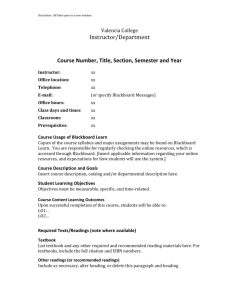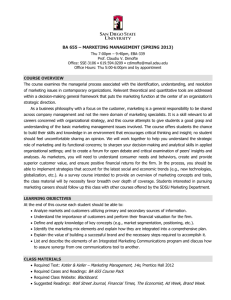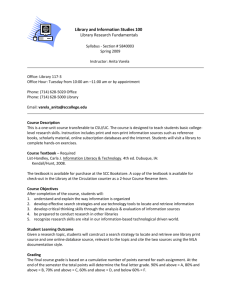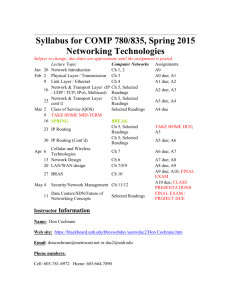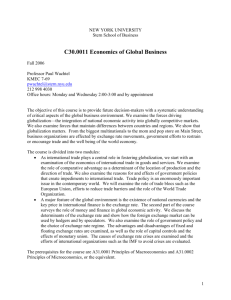the urban environment - Queens College Urban Studies
advertisement
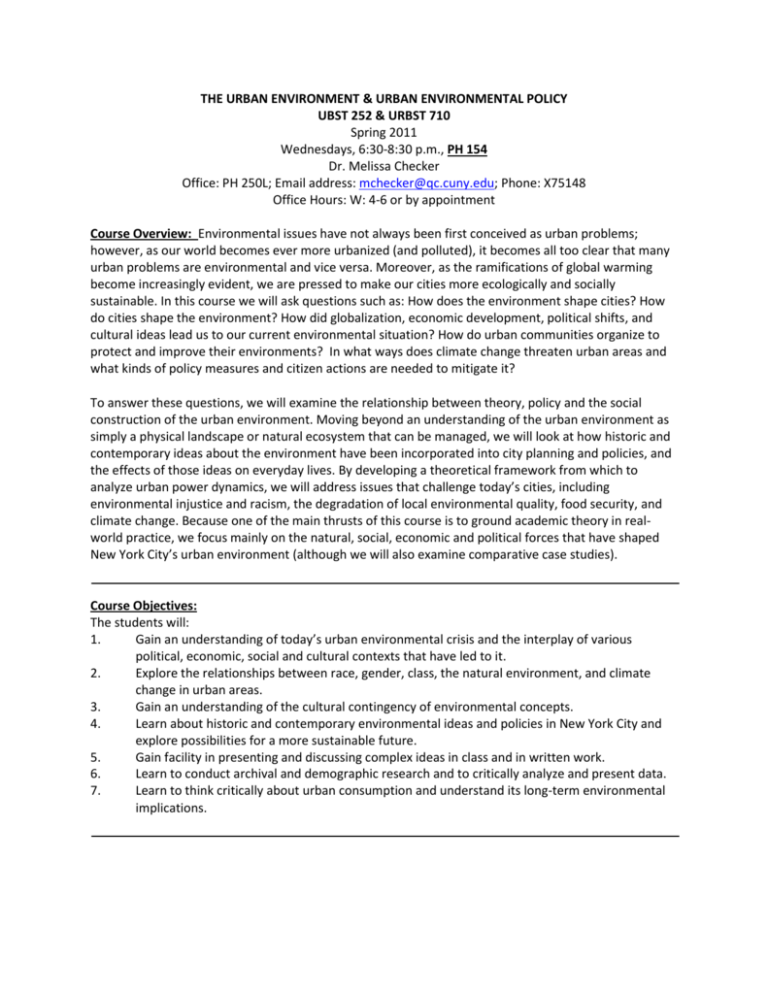
THE URBAN ENVIRONMENT & URBAN ENVIRONMENTAL POLICY UBST 252 & URBST 710 Spring 2011 Wednesdays, 6:30-8:30 p.m., PH 154 Dr. Melissa Checker Office: PH 250L; Email address: mchecker@qc.cuny.edu; Phone: X75148 Office Hours: W: 4-6 or by appointment Course Overview: Environmental issues have not always been first conceived as urban problems; however, as our world becomes ever more urbanized (and polluted), it becomes all too clear that many urban problems are environmental and vice versa. Moreover, as the ramifications of global warming become increasingly evident, we are pressed to make our cities more ecologically and socially sustainable. In this course we will ask questions such as: How does the environment shape cities? How do cities shape the environment? How did globalization, economic development, political shifts, and cultural ideas lead us to our current environmental situation? How do urban communities organize to protect and improve their environments? In what ways does climate change threaten urban areas and what kinds of policy measures and citizen actions are needed to mitigate it? To answer these questions, we will examine the relationship between theory, policy and the social construction of the urban environment. Moving beyond an understanding of the urban environment as simply a physical landscape or natural ecosystem that can be managed, we will look at how historic and contemporary ideas about the environment have been incorporated into city planning and policies, and the effects of those ideas on everyday lives. By developing a theoretical framework from which to analyze urban power dynamics, we will address issues that challenge today’s cities, including environmental injustice and racism, the degradation of local environmental quality, food security, and climate change. Because one of the main thrusts of this course is to ground academic theory in realworld practice, we focus mainly on the natural, social, economic and political forces that have shaped New York City’s urban environment (although we will also examine comparative case studies). Course Objectives: The students will: 1. Gain an understanding of today’s urban environmental crisis and the interplay of various political, economic, social and cultural contexts that have led to it. 2. Explore the relationships between race, gender, class, the natural environment, and climate change in urban areas. 3. Gain an understanding of the cultural contingency of environmental concepts. 4. Learn about historic and contemporary environmental ideas and policies in New York City and explore possibilities for a more sustainable future. 5. Gain facility in presenting and discussing complex ideas in class and in written work. 6. Learn to conduct archival and demographic research and to critically analyze and present data. 7. Learn to think critically about urban consumption and understand its long-term environmental implications. 2 In Class Etiquette/Rules to Live By Laptop use is NOT permitted class – that’s right, NO LAPTOPS IN CLASS. Sorry. It also goes without saying that the use of cell phone, I-Pods, I-phones, or any other electronic devises is also prohibited. Texting during class is particularly annoying. Incompletes will not be granted, except in extraordinary circumstances and with proper documentation. After-the-fact requests for extensions and incompletes will not be considered. I really mean this. Grade Change Policy (for all assignments): Students wanting clarification on a particular grade must submit a request in writing explaining their question and, if they are disputing an answer marked wrong, documentation of the grading error with evidence from the text. Emailed assignments will not be accepted. Technology: Blackboard: The Syllabus, assigned articles, homework assignments, and other information, including announcements, will be posted to our course web page on the CUNY Blackboard server. On that site you will also find supplemental materials designed to enhance your understanding of the course and its related topics. Information on how to log on to Blackboard is available through the Office of Converging Technologies. Email: Queens College requires that all students actively maintain and check their QC email accounts. Periodically, I will send important announcements through Blackboard to your QC email addresses. Please also use your QC email account to email me. It helps me know who you are, and ensures that you are checking that email. Academic Dishonesty and Plagiarism: Queens College takes cheating and plagiarism very seriously; if caught you may fail the course and/or be suspended from the college. So don’t cheat. This means that you should not take the words or ideas of another person and submit them without acknowledging the original author. Examples of plagiarism include taking phrases, sentences, paragraphs, or statistical findings from a variety of sources and piecing them together, without citing them, into a homework assignment. Taking phrases, paragraphs or papers from the internet and representing them as your own falls under this category. There are now sophisticated search engines that prove beyond a reasonable doubt when students have downloaded web-based material and submitted it as their own. You must always indicate when you have used an idea from someone else’s work; anything else constitutes stealing from others and violates both the ethics of this class and established academic standards. Course Texts: Checker, Melissa. Polluted Promises: Environmental Racism and the Search for Justice in a Southern Town. New York: NYU Press, 2005. Rogers, Heather. Gone Tomorrow: The Hidden Life of Garbage. New York: The New Press, 2005. Pancake, Ann. Strange As This Weather Has Been. Berkeley, CA: Counterpoint/ Shoemaker & Hoard, 2007. 3 You will need to order these books through your favorite on or offline retailer, or library. Other course readings are available on the course blackboard site. This course includes a heavy reading load – it is imperative that you find course readings immediately! Course Requirements: Attendance: Attendance in this course is essential to effective learning. It is the sole responsibility of the student to make up any work that is missed due to absence for any reason. Participation & Discussion Questions (24%). Of course, you are expected to keep up with course readings and participate in class discussions. To facilitate that process, you will complete six out of ten short assignments based on course readings. You may choose to skip any four assignments. These assignments are also designed to serve as a useful reading guide to help you navigate course readings. Assignments will be posted to the Blackboard site on the Sunday before they are due. All homework assignments MUST BE TYPED. They are due in HARD COPY and within the first 15 minutes of class. Emailed assignments WILL NOT be accepted. (Note: you will start receiving zeros once you have skipped four assignments. Conversely, I will only grade the first six that you complete). Mock Trial (11%): Towards the end of the semester, as a class, we will create our own environmental injustice scenario. Dividing into teams of defendants and plaintiffs, students will take various roles on either side of a trial for environmental justice. A “judge” will preside. Wastescape Essay/Final Exam (35%): Students will choose one commonly disposed of item in New York City and track where it goes – from the moment of its disposal of it to its final destination. Detailed instructions will be posted to the Blackboard site during the second week of class. You may turn this paper in any time between the fourth week of class and the day of the final exam. However, you must clear your topic with me BEFORE you start on the paper. Graduate student papers will be 10-12 pages; Undergraduate papers will be 7-8 pages. OR Final Exam: Students not wishing to write the wastescape paper may take a final exam during finals week, composed of short answer and essay questions. Environmental Justice Profile (30%): Students will divide into several teams and gather primary and secondary research to complete an “environmental justice” profile of the North Shore of Staten Island. Ultimately, all data will be compiled and summarized. This data will actually be used by an active environmental justice organization – students will therefore also be graded on the degree to which their presentation is clear, informative and user-friendly. As a class, we will undergo some training sessions on accessing certain databases and online mapping skills. Preliminary categories of research include: Demographic Profile (race/ethnicity, income, education, employment, age); Map truck routes; Health issues (asthma; cancer; lead levels, etc.); Map Schools; Map major toxic sites; Map and summarize New Development Projects; Map Green Space & Open Space; Map Residential areas including multi-family, single family residences, as well as zoning General history of neighborhood Traffic Data for certain neighborhoods Students will submit data throughout the first part of the semester. All data will be due in mid-March; 4 maps will be due in early to mid April; summaries will be due by the end of April. In addition to turning in their group summary, each student will also submit a one-page summary of their research experience. Students will receive individual, not group, grades. **Even more details on this assignment will be distributed in class.** Proposed Schedule of Readings/Activities: Please note! This schedule may be subject to some alteration over the course of the semester. In addition, because our topic is timely and dynamic, I may add relevant newspaper, blog, or short magazine articles to your list of readings. Please also feel free to suggest such readings to me, if you believe your fellow students will benefit from reading them. Week 1: Introductions; Course Overview Feb. 2 Distribute Consumption Quiz Go over Syllabus VIEW in class “The Story of Stuff” and/or “The Lifecycle of a Burrito” Week 2: The Social Construction of Space & Nature February 9: READ: Bickerstaff, Karen and Julian Agyeman, “Assembling Justice Spaces: The Scalar Politics of Environmental Justice in North-east England” in Spaces of Environmental Justice (p.219-256). William Cronon, “The Trouble with Wilderness; or, Getting Back to the Wrong Nature” in Uncommon Ground: Rethinking the Human Place in Nature (p.69-90). HW #1 Due Guest Speaker: Dr. Leonard Rodberg on INFOSHARE Weeks 3-4: Mutually Exclusive?: Cities & Green Space in Historic & Present Context February 16; READ: Rosenzweig, Roy and Elizabeth Blackmar. The Park and the People. “Introduction” (P.1-15) Hagerman, Chris. “Shaping Neighborhoods and Nature: Urban Political Ecologies of Urban Waterfront Transformations in Portland, Oregon” Cities 24(4): 285-297. View (in class): Eric Sanderson pictures New York – before the City HW #2 Due February 23: READ; Low, Setha, Dana Taplin and Susan Scheld, Chapters 2 & 3 in Rethinking Urban Parks (P.19-68) HW #3 Due Week 5: Talking Trash: Waste & Consumption March 2; READ: Rogers, Gone Tomorrow, Chapters 1-4 & 7 HW #4 Due VIEW: Garbage, Inc. 5 Week 6: Introduction to Environmental Justice March 9; READ: Checker, Polluted Promises, Chapters 1 & 3 Angotti, Tom. Chapter 5 in New York for Sale HW #5 Due Week 7: Public Perception & Pollution March 16; READ: Checker, Polluted Promises, Chapter 4 Aureyo and Swistun, Chapter 4 in Flammable: Environmental Suffering in an Argentine Shantytown HW #6 Due EJ Project Data due!! Guest Speaker: Mustafa Ali on EJ View Week 8: Scientific Bias March 23; READ: Checker, Chapter 5 Vedantam, Shankar. EPA Inspector Finds Mercury Proposal Tainted. Washington Post. February 3, 2005. http://www.washingtonpost.com/wp-dyn/articles/A61762-2005Feb3.html Schrader-Frechette, Kristin “Analyzing Public Participation in Risk Analysis” Environmental Justice 3(4), 2010 Estrella-Luna, Neenah, “Public Participation and Communicative Interaction” 3(4), 2010 HW #7 Due Week 9: March 30 MOCK TRIAL!!! Week 10: Food Justice & Community Gardens April 6; READ: Irazabal, Clara and Anita Punja, “Cultivating Just Planning and Legal Institutions: A Critical Assessment of the South Central Farm Struggle in Los Angeles.” Journal of Urban Affairs 31(1):123. Pena, Devon, “Farmers Feeding Famlies: Agroecology in South Central Los Angeles,” Keynote Address to National Association for Chicano and Chicana Studies”, 2006. Saldivar-Tanaka, Laura and Marinanne E. Krasny, “Culturing Community Development, Neighborhood Open Space, and Civic Agriculture: The Case for Latino Community Gardens in New York City,” Agriculture and Human Values 21, 2004. HW #8 Due EJ Maps Due Week 11: Food Justice: Farmer’s Markets & Urban Foraging April 13; READ: Alkon, Alison Hope and Kari Marie Norgarrd, “Breaking the Food Chains: An Investigation of Food Justice Activism.” Sociological Quarterly 79(3):289-305, 2009. 6 Guthman, Julie, “If They Only Knew: Colorblindness and Universalism in Alternative Food Institutions. The Professional Geographer 60(3):387-397”, 2008. Wehi, Priscilla M., and William L. Wehi, “Traditional Plant Harvesting in Contemporary Fragmented and Urban Landscapes”. Conservation Biology 24(2):594-604, 2009. HW #9 Due Week 12: The City and the Country: Consumption & Climate Change May 4; READ: Pancake, Ann Strange as this Weather Has Been VIEW (In Class), Judy Bonds Interviews on MTR HW #10 Due Week 13: Sustainable Cities May 11; READ: Angotti, Tom “Is the Long-term Sustainability Plan Sustainable?” Gotham Gazette, April 21, 2008. http://www.gothamgazette.com/article//20080421/210/2495 Krueger, Rob and Julian Agyeman, “Sustainability schizophrenia or ‘actually existing sustainabilities?’ Geoforum 35(4):410-417, 2005. Week 14: Presentations May 17 Final EJ Projects Due in Class!!!

